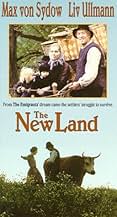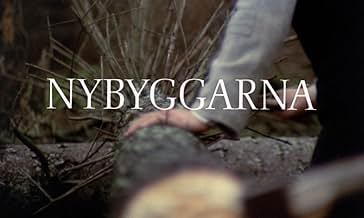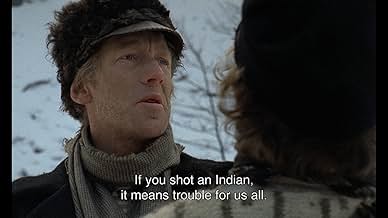IMDb RATING
8.0/10
5.7K
YOUR RATING
A Swedish immigrant family struggle to establish a new life for themselves in 1850s Minnesota.A Swedish immigrant family struggle to establish a new life for themselves in 1850s Minnesota.A Swedish immigrant family struggle to establish a new life for themselves in 1850s Minnesota.
- Director
- Writers
- Stars
- Nominated for 1 Oscar
- 9 wins & 1 nomination total
Karin Nordström
- Judit, hans hustru
- (as Karin Nordström-Järegård)
- Director
- Writers
- All cast & crew
- Production, box office & more at IMDbPro
Featured reviews
Picking up right where 'The Emigrants' left off, this film tells the story of an Swedish farming family who have staked out a claim and being their life anew in Minnesota. It's done in a highly realistic way, and we really feel the struggle of building a house, clearing the land, facing language difficulties, enduring the cold of winter, not having much money, and the possibly mortal threat of sicknesses. While it's giving us 1850's rural life in an authentic way, without a lot of glitz and a slower pace coming along as a part of that, it somehow does so without ever lagging over its 200+ minute run time, at least for me.
The story-telling a little more disjoint in this film, giving us bits of life in America almost as if in chapters, some parts of which we see once and then are never mentioned again. One example is the family's neighbors chastising them for their friendship with the former prostitute Ulrika (Monica Zetterlund), who has married a Baptist minister and converted to that faith, which they see as sacrilegious, and failing to note the irony in this view, given their own persecution prior to emigrating. It's a powerful scene, but nothing more comes of it. Similarly, we see a brief interval where Karl-Oscar (Max von Sydow) faces the possibility of going off to fight in America's Civil War after having been in the country for less than ten years, a perspective which was fascinating to me, but after he's rejected because of a limp, we hear nothing more about the distant fighting. Maybe this is like life.
Director Jan Troell is more daring stylistically during the flashback sequence involving the brother (Eddie Axberg), who goes off with a friend (Pierre Lindstedt) to try to find gold in California. Without spoiling anything, the surreal way he portrays this amplifies their harrowing ordeal, and I liked how the story behind how he returns with so much money is revealed.
The cast is wonderful, led by von Sydow and Liv Ullmann who have several great scenes. In one of the difficult moments, we see the attitude towards women in the period shown when she's told that getting pregnant again might prove fatal to her given past complications. She feels immense sadness over this because she feels like she wouldn't be a wife if this is true, and in turn, that she wouldn't be able to sleep with her husband if she couldn't risk pregnancy.
Unlike 'The Emigants', there is acknowledgment that the land these Swedish-Americans are farming was stolen from the Native Americans, but this is a film that is definitely told from a European perspective. Karl-Oscar defends himself, and we sympathize with him - he had no part in any of that, paid the government for the land, and has put in a lot of toil. We don't see any of the atrocities that the white settlers or the government committed, but we see some horrifying things the native Sioux do when backed into a corner and starving. One of the acts done after the killing of an entire white family is so brutally heinous, cruel, and disgusting that it seems to justify the mass hanging of Native Americans which follows. The events seem to be based loosely on the events of the Sioux Uprising in 1862, which led to the mass hanging of 38 Sioux in Minnesota. Still, I give the film credit for directly confronting the moral dilemma, though I struggle, wondering if there is an element here that is in a small way accepting one of America's two original sins. The film successfully strives for honesty through the lens of this family, achieves that, shows us just how hard life was in this period, and lets the viewer then grapple with what it all means. It made me think of the quote from Joyce, History is a nightmare from which I am trying to awake.
The story-telling a little more disjoint in this film, giving us bits of life in America almost as if in chapters, some parts of which we see once and then are never mentioned again. One example is the family's neighbors chastising them for their friendship with the former prostitute Ulrika (Monica Zetterlund), who has married a Baptist minister and converted to that faith, which they see as sacrilegious, and failing to note the irony in this view, given their own persecution prior to emigrating. It's a powerful scene, but nothing more comes of it. Similarly, we see a brief interval where Karl-Oscar (Max von Sydow) faces the possibility of going off to fight in America's Civil War after having been in the country for less than ten years, a perspective which was fascinating to me, but after he's rejected because of a limp, we hear nothing more about the distant fighting. Maybe this is like life.
Director Jan Troell is more daring stylistically during the flashback sequence involving the brother (Eddie Axberg), who goes off with a friend (Pierre Lindstedt) to try to find gold in California. Without spoiling anything, the surreal way he portrays this amplifies their harrowing ordeal, and I liked how the story behind how he returns with so much money is revealed.
The cast is wonderful, led by von Sydow and Liv Ullmann who have several great scenes. In one of the difficult moments, we see the attitude towards women in the period shown when she's told that getting pregnant again might prove fatal to her given past complications. She feels immense sadness over this because she feels like she wouldn't be a wife if this is true, and in turn, that she wouldn't be able to sleep with her husband if she couldn't risk pregnancy.
Unlike 'The Emigants', there is acknowledgment that the land these Swedish-Americans are farming was stolen from the Native Americans, but this is a film that is definitely told from a European perspective. Karl-Oscar defends himself, and we sympathize with him - he had no part in any of that, paid the government for the land, and has put in a lot of toil. We don't see any of the atrocities that the white settlers or the government committed, but we see some horrifying things the native Sioux do when backed into a corner and starving. One of the acts done after the killing of an entire white family is so brutally heinous, cruel, and disgusting that it seems to justify the mass hanging of Native Americans which follows. The events seem to be based loosely on the events of the Sioux Uprising in 1862, which led to the mass hanging of 38 Sioux in Minnesota. Still, I give the film credit for directly confronting the moral dilemma, though I struggle, wondering if there is an element here that is in a small way accepting one of America's two original sins. The film successfully strives for honesty through the lens of this family, achieves that, shows us just how hard life was in this period, and lets the viewer then grapple with what it all means. It made me think of the quote from Joyce, History is a nightmare from which I am trying to awake.
"The New Land" is the second half of a story started in Troell's "The Emigrants," which depicted the struggles of a band of Swedish peasants in their move to America. Here, several of the settlers- such as the priest and the prostitute- move away in the first half-hour and reappear here and there throughout the rest of the film. The plot focuses on Karl-Oscar, his wife Kristina, and the family they try to raise in the Minnesota wilderness.
Von Sydow and Ullmann are given a chance to embellish on their characters, and they both do excellent work. Axberg also does a fine job of lending more depth to the character of Robert, Karl-Oscar's rebellious younger brother. There is also material worked in that examines the mistreatment (and eventual uprising) of local Native Americans and the futile searches for gold in the north. These other elements do not always seem to fit with the central story, but they effectively add to the sense of time and place anyway.
"The New Land" does not have the same emotional impact that "The Emigrants" had, but it develops the two central characters more and intelligently explores how they learn to adapt to their new life. Put together, these two films convincingly illustrate the plight of those who forged our frontier.
Von Sydow and Ullmann are given a chance to embellish on their characters, and they both do excellent work. Axberg also does a fine job of lending more depth to the character of Robert, Karl-Oscar's rebellious younger brother. There is also material worked in that examines the mistreatment (and eventual uprising) of local Native Americans and the futile searches for gold in the north. These other elements do not always seem to fit with the central story, but they effectively add to the sense of time and place anyway.
"The New Land" does not have the same emotional impact that "The Emigrants" had, but it develops the two central characters more and intelligently explores how they learn to adapt to their new life. Put together, these two films convincingly illustrate the plight of those who forged our frontier.
This is an extraordinary film, which I gave 10 out of 10 even if Warner Brothers, the film's theatrical distributor, cut the film in half for its American release. If ever this film (and its predecessor, "The Emigrants") makes it to DVD, I sincerely hope those 102 minutes are restored, so that I can at last see the film that Jan Troell intended for me to see.
As it looks on video, "The New Land" is still magnificent - its depiction of Swedish immigrants settling in frontier Minnesota outdoing every Western ever made. Be sure to look for the scene that George Lucas stole wholesale where Max von Sydow slaughters an ox and places his freezing son inside it during a snowstorm.
As it looks on video, "The New Land" is still magnificent - its depiction of Swedish immigrants settling in frontier Minnesota outdoing every Western ever made. Be sure to look for the scene that George Lucas stole wholesale where Max von Sydow slaughters an ox and places his freezing son inside it during a snowstorm.
"The New Land" finishes the story begun in Jan Troell's "The Emigrants," which was released the year before. It's a longer and bleaker film. "The Emigrants" was harsh, but at least in that film the people making the arduous journey to America had the promise of all that America had to offer (or at least what they thought it had to offer) to get them through the tribulations. But in "The New Land," they've settled into that life, and their new home proves not to be the utopia they dreamed.
It's astonishing how authentic these films feel, and it's hard to remember while watching them that they were made in the early 1970s. "The New Land" has some really difficult passages to watch, namely one involving the murder of a settler family at the hands of a gang of Native Americans -- including the horrific death of a baby -- and another an extended segment that details the nightmarish fever dream of a journey two of the settlers take to mine for gold in California. This story line started to feel long to me, and in a film that clocks in at nearly three and a half hours I wouldn't have minded this one being left on the cutting room floor. But it doesn't mar the overall brilliance of this film as a stand alone story, or the entire two-film saga.
And unlike "The Emigrants," which I only found in a dubbed version, "The New Land" is subtitled in English, which makes for a much more pleasant viewing experience.
"The New Land" was nominated for Best Foreign Language Film at the 1972 Academy Awards, in the same year that "The Emigrants" was nominated in four categories, including Best Picture.
Grade: A
It's astonishing how authentic these films feel, and it's hard to remember while watching them that they were made in the early 1970s. "The New Land" has some really difficult passages to watch, namely one involving the murder of a settler family at the hands of a gang of Native Americans -- including the horrific death of a baby -- and another an extended segment that details the nightmarish fever dream of a journey two of the settlers take to mine for gold in California. This story line started to feel long to me, and in a film that clocks in at nearly three and a half hours I wouldn't have minded this one being left on the cutting room floor. But it doesn't mar the overall brilliance of this film as a stand alone story, or the entire two-film saga.
And unlike "The Emigrants," which I only found in a dubbed version, "The New Land" is subtitled in English, which makes for a much more pleasant viewing experience.
"The New Land" was nominated for Best Foreign Language Film at the 1972 Academy Awards, in the same year that "The Emigrants" was nominated in four categories, including Best Picture.
Grade: A
Did you know
- TriviaThe movie and its prequel Les Émigrants (1971) were Oscar nominated on the same year (1972), though in different categories. This is the first and only occurrence of such an event.
- GoofsIn one of the first scenes, when Karl Oskar is taking the family to the new settlement, the boom mic is visible in the upper left corner for the entire shot.
- Quotes
Karl-Oskar: Kristina, do you remember when we moved here last fall, you said it was almost as pretty as back home in Duvemåla? Maybe we could call our home here Duvemåla. What do you say to that? Or New Duvemåla.
Kristina: Just think, that I - Duvemåla.
Karl-Oskar: Yeah.
Kristina: Then we don't live at Ki-Chi-Saga any more. We live at Duvemåla.
- Alternate versionsThe USA television version, called "The Emigrant Saga" consists of this film plus its prequel, Les Émigrants (1971), joined and re-edited together in chronological order and dubbed in English.
- ConnectionsFeatured in Stjärnbilder (1996)
- How long is The New Land?Powered by Alexa
Details
Contribute to this page
Suggest an edit or add missing content



















